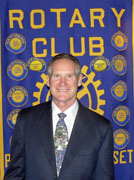The Inner City Check Cashing Industry, by Tom Nix

Tom Nix’s family came from San Pedro, and he worked his way up from a rough childhood to found a check-cashing business, a new concept at the time, in South Central Los Angeles. His father had started a small grocery store, and also cashed checks for customers. From helping his father in this business grew his concept of starting a check-cashing business.
Tom finished high school and did well in school, but got into many fights with others his age, about drinking, girls and fighting each other to prove their toughness. He was admitted to USC and soon started to fit in with the more upper-class culture there, playing one year of football under John McKay. After graduating in 1970, he married his high school sweetheart, Pam.
In 1976, he was doing well and was a reserve Los Angeles County Deputy Sheriff, but had temper-control problems, mood swings and was a binge eater and drinker, overweight, and had a peptic ulcer. After entering a self-help program, he stopped blaming others and started focusing on positive thoughts on where he was going, not where he was. 2 years later he opened his first check-cashing business, Nix Check Cashing, and in one year was cashing $1 million of checks per week. He staffed the business with local people, part of their community, with fast, friendly, affordable and courteous service. This became much more popular in the community then the banks which didn’t have local branches there and required bank accounts and a good credit history to cash checks. After opening additional locations in the community, he needed more capital to grow, and formed a private partnership in 1983 with friends and contacts. They raised $4.6 million and grew to 19 stores.
He charged only 2% of the value of checks for cashing, and losses were about 5% of net revenue. Most of these were payroll checks, and if they bounced, he could only go after the employer and not the employee. He discussed how the payday loan industry is different, located more in middle-income areas, requiring a bank account and typically charging much more, often trapping people into accelerating indebtedness. Banks don’t generally cash checks; they just place a hold on them for a few days until they can collect the amount from the payer.
By 1991, he formed a joint venture with Western Union to add check-cashing to their services. This resulted in threats against him by organized crime members from Chicago. The next year, riots broke out in Los Angeles, a further business setback. In 1993 he developed the concept of a check-cashing store inside a store, in grocery chain stores, drugstores, gas stations and McDonald’s, to make his business more visible and available. He bought out his interests from Western Union. In 2000 he partnered with Union Bank of California to bring banking service to low-income communities previously unserved by banks. However, this arrangement was not approved by the government, which thought it too risky for the banks.
He has gotten awards and community recognition for placing community service before profits, serving an underserved market niche ignored by other businesses. Several years ago, he sold his business for $45 million to Kinecta Federal Credit Union (formerly Hughes Aircraft Credit Union), and retired after another 2 years of advising his successors. Last year he published a book about his career and what he has learned about business success and ethics, called Nixland: My Wild Ride in the Inner City Check Cashing Industry. He gave out copies at our meeting, and it is available from his website, www.nixland.net, or at bookstores and online retailers.